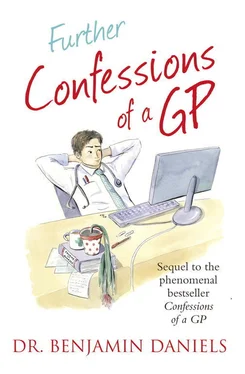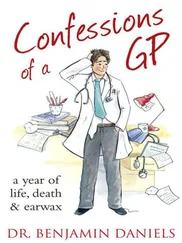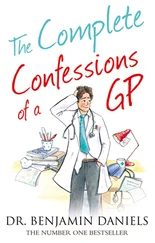I was prepared for the worst but to my surprise, John’s bum smelled fine. It didn’t smell like spring meadows or an ocean breeze, but there was certainly not the horrendous reek that he had been describing. Having never actively smelled any other man’s behind, I was lacking a benchmark for comparison, but to my part relief and part annoyance, there was absolutely no reason why I needed to have my nostrils in such close proximity to his anus.
John was overjoyed when I told him his bum didn’t smell. He did need some convincing and at one point seemed to be suggesting that I check again, but fortunately he did eventually take my word for it. Having managed to belatedly resolve the dilemma of the phantom smelly-bum syndrome, I had two options: I could of course simply wave John on his way having cured him of his complaint, or I could take the professional and appropriate option, which was to sit John back down and delve deeply into his inner psyche, to try to establish what previous trauma had culminated in his long-lasting and deeply disturbing delusional paranoia about his bottom.
I thought about it for a millisecond…
‘Bye, John. Glad we’ve sorted this all out for you. All the best.’
As far as I’m concerned, smelling John’s bum was already beyond the call of duty that afternoon. His 10 minutes were up and the opportunity to explore his inner psyche would have to wait for another day.
It had been a few months since I had last seen Tarig and failed yet again to persuade him to agree to take HIV medication. Unexpectedly, I had a request to urgently phone his wife. I didn’t know Tarig’s wife well as she rarely came in to see me, but I often wondered what she made of his decision to not treat his HIV. She herself had tested negative to the disease and had, on the surface at least, stuck loyally by her husband’s side. She must have known that his decision not to have treatment was effectively a choice to commit suicide.
‘Doctor, please come. Tarig is confused and unwell.’
As I arrived, his wife greeted me at the door.
‘Doctor, please don’t mention the HIV in front of the children. They don’t know,’ she whispered.
Tarig was in bed looking pale and unwell. He was saying some words in a language that I took to be Arabic, but his wife assured me that he was confused and making no sense. It was clear that Tarig was really sick. Once the immune system becomes very weak, numerous types of infection can take hold and I wasn’t sure which one was making Tarig so unwell. Severe forms of pneumonia and meningitis are common, but regardless of which infection had taken hold, he clearly needed to go to hospital. In any other circumstances, I wouldn’t have thought twice about calling an ambulance for such a severely unwell man in his 40s. With Tarig, though, we had spoken on numerous occasions about his specific wishes not to be treated for his HIV. In hindsight I wish we had put together some sort of living will or something in writing to prepare for this very situation. We hadn’t, so I had to make a decision. Tarig’s wife and two teenage children were in floods of tears. There was no way that I could leave him at home to die. He was now too confused and unwell to refuse hospital admission, so I went against my patient’s previously expressed wishes and dialled 999.
These decisions are really tricky. If a person is actively suicidal and threatening to jump off the nearest building, they can be ‘sectioned’ (compulsorily detained in a psychiatric hospital) and incarcerated against their will for their own safety. Tarig’s refusal to take medication to treat his HIV was equally suicidal in its nature, but he wasn’t mentally unwell. He fully understood the implications of his actions and although most people would feel that this decision was wrong, there is no law against being wrong. The alternative to leaving him to die would be to lock up Tarig against his will and to hold him down and force him to take medication every day. I’ve seen this done in psychiatric units and it is frightening and brutal to watch. Severely mentally ill patients are only forced to take medication for a short period of time because they are so unwell that in their psychotic state they have no concept of what is real and what isn’t. They don’t have the ability to weigh up decisions rationally. The same couldn’t be said for Tarig. He had been calm and rational during our previous conversations and well aware of the implications of the decision he was making. Right now, though, he wasn’t well and as he had lost the ability to make a rational decision, I made one for him.
I worried about the ethics of that decision for some time afterwards. However, after spending some time in hospital, Tarig was discharged home and to my amazement he was voluntarily taking HIV medication. ‘I had a lot of time to think in hospital and I decided that God wasn’t ready for me to die just yet,’ he explained.
‘Good,’ was all I decided to say in response. He neither thanked me nor criticised me for my decision to send him to hospital that day and so we never discussed it.
Over the previous year I had engaged Tarig in numerous theological debates and completely failed to persuade him that God didn’t want him to die. Clearly it took his own near-death experience for him to come to this conclusion himself. I’m just relieved that he did.
Should we know how much health care costs?
The NHS is running out of money. We are told this on an almost daily basis, but what you may not be aware of is that GPs like me have been told that we are now going to be the people in charge of balancing the books. One of the reasons that GPs have been given this large responsibility is that we generally run our own surgeries fairly efficiently and it would appear that, at the time of writing, the coalition feel that this effective management can be extended to the entire NHS. The truth is, I don’t really know much about accountancy. My surgery runs efficiently enough, but only due to my heavy reliance on our practice manager. She steadfastly makes sure that there is enough money for everyone to get paid and that we get the best deal on our toilet roll order. I get on with trying to make the patients get better and as a business plan it works well enough.
I was against the new health legislation, but am not totally against both doctors and patients actually knowing how much things cost. Each day I sit with a metaphorical book of blank cheques of taxpayers’ money and I write up prescriptions, order tests and make hospital referrals. All of these have a price and therefore cost money to the NHS and hence all of us who pay tax. Up until recently I was blissfully ignorant as to how much these all cost, but GPs are now being put in charge of the local health budgets and as a result of these changes, I am now beginning to get an idea.
Many doctors and patients are scared of thinking of health care in terms of money. The fear is that we medics will no longer see you all as real people in need of medical support, but instead as pricey leeches draining away our budgets. I would like to think I am capable of considering the financial value of what I do without it automatically having a detrimental effect on my clinical decisions.
If it were up to me, I would make up for the NHS shortfall by scrapping the recommissioning of Trident nuclear submarines – £20 billion would make our budgeting meetings considerably easier to bear. With that sort of injection of cash, the improvements we could make to patient care would be staggering. Of course, the whole point of the coalition’s new health act is to make do with less money rather than more and therefore the only places we’ll find any cash will be through reducing our own inefficiencies. Anyone who works within the NHS could list several ways in which we could work more efficiently. Traditionally, doctors have thought of these shortcomings in terms of wasted time for us, and poor service for patients, but now we will be encouraged to think of them from a more financial perspective.
Читать дальше
Конец ознакомительного отрывка
Купить книгу











![Benjamin Franklin - Memoirs of Benjamin Franklin; Written by Himself. [Vol. 2 of 2]](/books/747975/benjamin-franklin-memoirs-of-benjamin-franklin-wr-thumb.webp)
![Benjamin Franklin - Memoirs of Benjamin Franklin; Written by Himself. [Vol. 1 of 2]](/books/748053/benjamin-franklin-memoirs-of-benjamin-franklin-wr-thumb.webp)